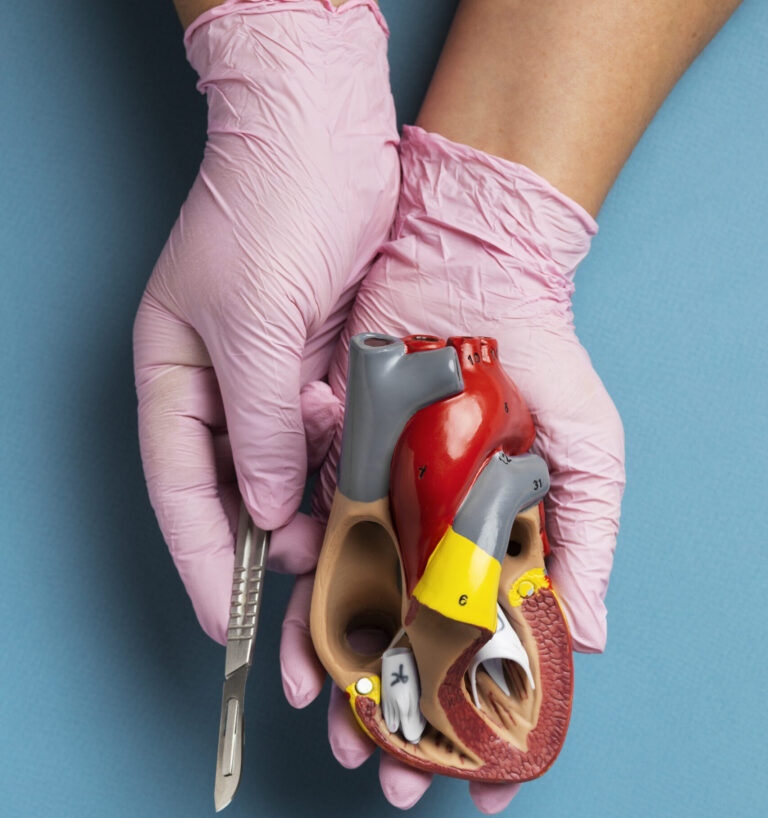Transcatheter Aortic Valve Implantation (TAVI)
Transcatheter aortic-valve implantation (TAVI) is an innovative procedure involving the insertion of a bioprosthetic valve through a catheter, which is then implanted within the diseased native aortic valve.
This procedure was first performed in 2002, and since then, it has gained widespread acceptance for treating severe aortic stenosis in patients at high surgical risk around the world. In India, this treatment option has attracted both domestic and international patients.
Steps 2 Cure, with a panel of top cardiologists in the country, offers patients a successful and cost-effective choice for TAVI.

Symptoms
Factors making TAVR (Transcatheter Aortic Valve Replacement) more likely to be recommended than SAVR (Surgical Aortic Valve Replacement) include conditions that would increase the risk of traditional open-heart aortic valve replacement surgery such as:
- Older age
- Frailty
- Weakened heart
- Previous heart surgery
- History of stroke
- Chronic obstructive lung disease (COPD)
- Liver disease
- Kidney disease
- Diabetes
- Previous radiation treatment to your chest
- Large calcium deposits in the blood vessel that carries blood away from your heart (ascending aorta), called porcelain aorta
When to access Medical Care
This procedure works just fine for patients with severe aortic stenosis and cardiac symptoms for whom conventional surgery to replace the aortic valve was associated with high risk. TAVR can be an effective option to improve the quality of life in patients who otherwise have limited choices for the repair of their aortic valves.
TAVI is available for patients with severe symptomatic aortic stenosis in all risk categories (low, intermediate, or high) for standard open-heart valve replacement surgery. The risk level is based on the chance of not surviving surgery. Low risk is less than a 4% chance of not surviving. Intermediate risk is 4% or higher and high risk is 8% or higher. TAVI can be an effective option to improve the quality of life in patients who otherwise have limited choices for the repair of their aortic valve.
Determinants of risk
Risk factors associated with fibromyalgia comprise:
- Gender: Fibromyalgia is more frequently diagnosed in women than in men.
- Family history: Having a parent or sibling with the condition may increase your likelihood of developing fibromyalgia.
- Other underlying disorders: Conditions like osteoarthritis, rheumatoid arthritis, or lupus could raise the risk of developing fibromyalgia.
Recovery process
Recovery duration varies, contingent on factors like patient characteristics, chosen procedure, and the extent of severity.
Why entrust your care to us?
At Steps 2 Cure, our foundation of trust is built upon several key pillars that ensure your confidence in our services and expertise. Our team comprises highly qualified professionals with extensive experience in their respective fields. Their knowledge and skills enable us to offer you the best possible care and solutions for your medical needs. We understand that each individual is unique, and so are their healthcare requirements.
That’s why we prioritize tailoring our treatments and approaches to your specific circumstances, ensuring that you receive care that is truly designed for you. You are at the heart of everything we do. Your comfort, concerns, and aspirations guide our efforts. Our compassionate approach ensures that you feel valued and supported throughout your healthcare experience.
To commence the treatment procedure, you can start by forwarding your questions via WhatsApp at (+91 99xxxxxxxxx) or by sending an email to care@steps2cure.com. Our team will ensure a swift response to your queries.
Transcatheter Aortic Valve Implantation (TAVI)
Still have a Query?
Your health and peace of mind matter to us, and we’re dedicated to addressing any inquiries you may have with care and expertise. Feel free to reach out.
Subsribe To Our Newsletter
Stay in touch with us to get latest news and special offers.

